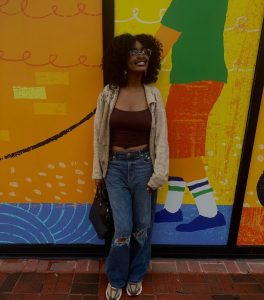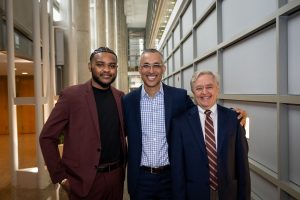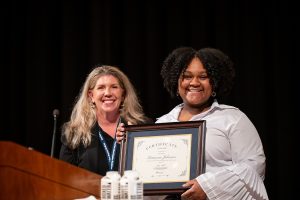The first time Eriona Birts’ father stepped foot on a college campus was alongside her on a tour of Bard College in upstate New York.

“He never got to go to college,” she says. “It became something that I wanted to do, not only for me, but also for him.”
Now a first-year student at Bard, Birts is a graduate of Baltimore’s Paul Laurence Dunbar High School and the 2024 Baltimore Youth Poet Laureate. She’s also the most recent recipient of the Henrietta Lacks Dunbar Health Sciences Scholarship, which provides a Dunbar graduate with $10,000 per year for four years to pursue a career in heath science at any college or university. The scholarship was established in 2011 and is funded by the Johns Hopkins Institute for Clinical and Translational Research (ICTR).
The ICTR, led by Dan Ford, MD, MPH, the David M. Levine Professor of Medicine and senior associate dean for clinical and translational medicine at the Johns Hopkins School of Medicine, is deeply invested in community engagement.
“Dunbar is right across the street from us, and we want to promote a stronger relationship with that partner,” Ford explains.
Despite the high school’s proximity to Johns Hopkins, none of the scholarship applicants or their families have had prior connections to the institution.
While the scholarship supports Dunbar students, it honors the life of Henrietta Lacks. Lacks, a young mother of five, was an African American cervical cancer patient at Hopkins in 1951. Lacks passed away at age 31, but her cell line, known as “HeLa,” has made a lasting impact on both medical science and important bioethical issues, like informed consent.
Though Lacks’ daughter, Deborah, was a child when her mother died, she developed an interest in biology and the science of cells as an adult researching the final months of her mother’s life.
“We thought if we support young individuals that want to go into a career in health care science, that’s part of the Lacks family legacy,” Ford says.

Jamie Seward, senior associate director of alumni relations in the Johns Hopkins School of Medicine, leads a committee of colleagues from across Hopkins and Baltimore to select each year’s recipient. She echoes the importance of honoring the life of Henrietta Lacks.
“I totally support Hopkins’ commitment to the local community and to carrying on Henrietta Lacks’ legacy, which is a pain point for a lot of people in the community,” she explains. “We’re taking something that was not perceived as positive to do something positive for local students.”
Members of the Lacks family celebrate each new scholarship recipient by attending the annual Henrietta Lacks Memorial Lecture.
A second goal of the scholarship is to support students from underrepresented backgrounds interested in pursuing a career in health sciences.
“Our research and clinical workforces have to be diverse to promote more trust for people in the community,” Ford says. “This is our small contribution to improving the diversity of the workforce.”
Seward and the committee work together to review candidates’ letters of recommendation, grades, test scores, and essays. Once a recipient is selected, the ICTR provides mentorship throughout the recipient’s higher education journey.

“One of the most important parts is our colleagues who serve on the committee,” Seward says. “This takes up a lot of their time, and I appreciate them so much because I can’t do it without them.”
She adds the committee is able to get to know the candidates through virtual interviews, which is “where the magic happens.”
“All the candidates are great,” she says. “Access to education and the ability to pursue your dreams is incredibly important. Not everybody is lucky enough to have advantages. If we can help give one kid an advantage to make college easier and more accessible, we’ve done a small part to help somebody pursue their dreams.”
For Birts, receiving the scholarship was a moment of immense pride and motivation. At Bard, she is pursuing a psychology major on a pre-medicine track, with aspirations of becoming a psychiatrist. She is also planning to start an initiative to bring poetry and spoken word to nearby Boys and Girls Clubs, aiming to make a positive impact on her college community.
“I’m excited about really getting hands-on experience with the community work that I want to do in the future,” she says.
Topics: Faculty and Staff, Friends of Johns Hopkins Medicine, Johns Hopkins Medicine, School of Medicine, Support Scholars